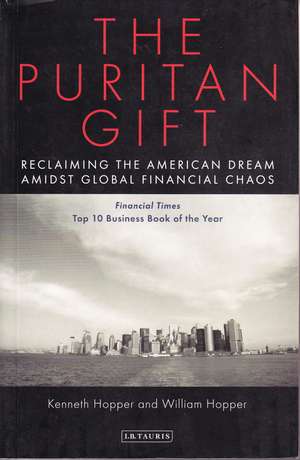The Puritan Gift: Reclaiming the American Dream Amidst Global Financial Chaos
Autor Kenneth Hopper, William Hopper Prefață de Russell L. Ackoffen Limba Engleză Paperback – 13 ian 2009
Preț: 173.19 lei
Preț vechi: 212.21 lei
-18% Nou
Puncte Express: 260
Preț estimativ în valută:
33.15€ • 36.02$ • 27.86£
33.15€ • 36.02$ • 27.86£
Carte tipărită la comandă
Livrare economică 22 aprilie-06 mai
Preluare comenzi: 021 569.72.76
Specificații
ISBN-13: 9781845119867
ISBN-10: 184511986X
Pagini: 360
Ilustrații: 15 integrated black and white illustrations
Dimensiuni: 129 x 198 x 33 mm
Greutate: 0.39 kg
Editura: Bloomsbury Publishing
Colecția I.B.Tauris
Locul publicării:London, United Kingdom
ISBN-10: 184511986X
Pagini: 360
Ilustrații: 15 integrated black and white illustrations
Dimensiuni: 129 x 198 x 33 mm
Greutate: 0.39 kg
Editura: Bloomsbury Publishing
Colecția I.B.Tauris
Locul publicării:London, United Kingdom
Notă biografică
Kenneth Hopper has been active throughout his professional life as a writer on industrial affairs and a consultant in both the U.S.A. and Europe. He was born in Scotland and is now a U.S. citizen living in New Jersey. William Hopper (his brother) lives in London and has spent his career in investment banking in New York and London. Their combined knowledge of manufacturing and finance gives this book its unique depth and perspective.
Cuprins
THE PURITAN GIFTCONSOLIDATED LIST OF CORRECTIONS AND ADDITIONS (as of 08/10/08)Page Lines from top ChangesDEDICATION PAGEvadd the following poem towards the centre of the page:One ship sails East and another West,By the self-same winds that blow.'Tis the set of the sails, and not the gales,That tells the way we go. Ella Wheeler Wilcox, Poems of Progress. 1911.>First Light of the True Dawn? >>Do the same to the chapter heading on page 262 and to the page headings on pages 265, 267, 269, 271, 273, 275 & 277PREFACExi10Italicise: >>Ecole Polytechnique>>12after >>France.>> add: >>Anderson's College is now the University of Strathclyde.>>15replace: >>Systematic Organic Chemistry (1937),>> with: >>Systematic Organic Chemistry: Modern Methods of Preparation and Estimation (1923, 1931, 1937, 1950), >> 33 add: >>to>> in front of: >>a Japan>> 37 add period after: >>.com.>>xii 15 replace >>special>> with: >>specialist>> 37 insert >>(sic)>> after: >>technical>>24 replace >>(see page 114)>> with: >>(see pages 114 and 115)>>: 27 add >>the late>> in front of: >>George>>ACKNOWLEDGEMENTSxiv 05insert >>Electronic>> in front of >>Network>>Mark Tully,>> add >>Roger Schenke, Executive Vice President, the American College of Physician Executives; Professor Peter Kawalek, Manchester Business School; David Howard, Management-NewStyle Limited >>12 replace >>Brinkman>> with: >>Brinkmann>> 14 replace >>Kenneth>> with: >>Kenton>>15omit >>David Howard>>18replace >>, as well as>> with: >> ; >>20insert comma after >>Jersey>> 20 replace >>as well as>> with >>and>>17add >>Gerald Shalet>> before >>Martin Shelley>> 17 add >>Anthony Tylecote,>> after >>Martin Shelly,>>NOTE TO EDITOR: PLEASE ENSURE THAT NAMES IN THE SECOND PARA ON THIS PAGE ARE IN STRICT ALPHABETICAL ORDER BY SURNAMEPROLOGUExvi19replace >>in June 2006>> with >>in BusinessWeek in 2006>> [note: BusinessWeek is one word.]PART I: ORIGINS(no changes)CHAPTER 103 epigraph Zeale is but a wilde-fire without knowledge. Rev. John Cotton. Boston, Massachusetts. 1651.04add >>of the United States>> after: >>most citizens>> 10/11 remove >>intimately>> [word appears twice in para]06 04/06substitute: >>An anonymous source tells us that etc>> for: >>Captain Staughton.to England that etc>>31 replace >>would do>> with >>did>>10 04 replace >>expression>> with >>exposition>> [misquotation]1209insert >>in mid-July:>> after >>Thames>>13 03Insert before >>For a century and a half.>> the following para:>>The settlers of the 1630s had modeled themselves on the people of the Old Testament, the Puritan values and practices which Tawney described so vividly being largely Jewish in inspiration. It is therefore not surprising that, when first German and then Russian Jews moved in large numbers to the New World in the nineteenth century, they should have found the established American mores to their liking and become successful in business. In so doing, the newcomers both perpetuated and enhanced the great tradition of good management inherited from the first settlers. (Interestingly, the prophet Mani is said to have formed his religious outlook while dwelling in an ascetic Jew
Descriere
Where does the Protestant work ethic come from? And how did America achieve such dominance in management for so long? "The Puritan Gift" traces the origins and the characteristics of American managerial culture which, in the course of three centuries, turned a group of small colonies into the greatest economic and political power on earth. It argues that the drive, energy and acceptance of innovation, competition, growth and social mobility, all of which lie at the root of America's management culture, have their origins in the discipline and ethos of America's first wave of European immigrants: the Puritans.And, the authors warn, as Americans distance themselves from the core values which produced their business and economic successes during the nineteenth and twentieth centuries, they put their future prosperity and security at risk. This is an original exploration of the dramatic and far-reaching consequences of the Puritans' 'gift' to America - the ethos which produced the early success of America and what came to be known as the American dream.
